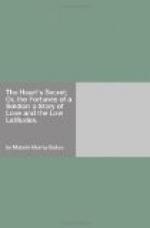“The queen was right-he had no heart to give. A countess? She might have brought him higher title, a prouder name, richer coffers; but he is not one to weigh my love against gold, or lineage, or proud estates, or even royal favor; such, such is the man to whom I owe my very life, my father’s life, Ruez’s life, nay, what do I not owe to him? since all happiness and peace hang upon these; and yet I repulsed, nay, scorned him, when he knelt a suppliant at my feet. O, how could a lifetime of devoted love and gentleness repay him all, and make me even able to forgive myself for the untrue, unnatural part I have played?”
She covered her face with her hands, as if to efface the memory of the conduct which she had just recalled so earnestly, and then rising, walked back and forth in her apartment with all the impetuosity of her Creole blood evinced in the deepened color of her cheek, and the brightness of her beauteous eyes. Then once more seating herself, she sat and trotted her foot impatiently upon the floor.
“O, why, why cannot I recall the past; alas, I see my error too late. Pride, pride, how bitterly and surely dost thou bring thine own reward!”
She strove to answer the letter that now lay open before her upon the table, but could scarcely hold the pen, so deep and long drawn were the sighs that struggled in her bosom. Sheet after sheet was commenced and destroyed. Tears drowned out the efforts of her pen, and she knew not what to do. She bit her fair lips in vexation; what should she write? Once more she read his note, and full of the feelings it induced, tried to answer it. But in vain; her sheet was bathed in tears before she had written one line.
“It is but the truth,” she said, to herself, “and I do not care if he knows it.”
As she thus spoke, she once more seized the pen and wrote:
“In vain have I essayed to write to you. Let these tears be your answer! Isabella Gonzales.”
If the beautiful girl had studied for months to have answered the letter of him who loved her so well, it would have been impossible for her to have penned a more touching, more truthful, or more eloquent reply than this. Striking a tiny silver bell by her side, a slave approached, and was despatched with this note at once to the palace of the governor-general.
“Why, sister!” said Ruez, entering the room and speaking at the same time, “you look as if you had been weeping. Pray, are you ill?”
“Nay, brother, I am not ill. It was but a slight affair; it is all over now. Where’s Carlo, Ruez?”
The attempt to turn the course of conversation to the dog, was not unobserved by the intelligent boy. He saw at once that there was some matter in his sister’s heart that was better to remain her own property, and so, with a kiss, he said no more, but sat down at the window and looked off upon the brilliant afternoon effect of the sun and the light land breeze upon the water. Neither spoke for many minutes, until at last Ruez, still looking off upon the waters of the outer harbor, or Gulf Stream, said:




